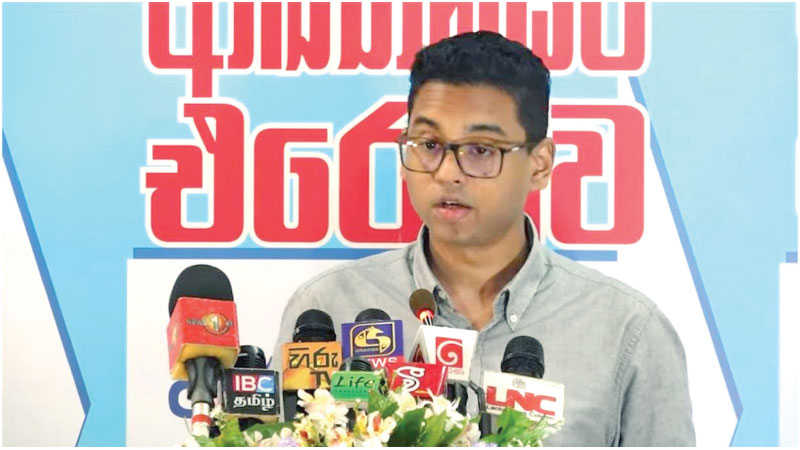An economic forum titled, “Countering Neo-Liberal Narrative: IMF, Economics & Alternatives” convened at the Colombo Public Library Auditorium on Tuesday (27), drawing a diverse audience of academics, political activists, economists, trade unionists and concerned citizens. Organised by People’s Struggle Alliance (PSA), the event aimed to critically examine the prevailing neoliberal economic policies, particularly those promoted by the International Monetary Fund (IMF) in the backdrop of the current economic crisis, and to explore viable alternatives tailored to Sri Lanka’s unique socio-economic context.
At the centre of the forum was political economist and researcher Shiran Illanperuma, who delivered a forceful critique of the IMF’s influence on Sri Lanka’s ongoing economic trajectory. Addressing the gathering, Illanperuma said that the IMF’s policy prescriptions involved fiscal austerity, privatisation, market deregulation, and currency devaluation while prioritising macroeconomic stability at the expense of long-term development, social welfare, and national sovereignty.
“The IMF’s approach tends to treat economies as abstract models, neglecting the lived realities of the people,” Illanperuma said. “We need to challenge the notion that there’s a one-size-fits-all solution to economic crises.”
Alternative approaches
Drawing on examples from other countries that have successfully pursued heterodox economic models, Illanperuma underscored the need for Sri Lanka to develop policies that place the welfare of ordinary citizens at the centre of macroeconomic reform. “It’s imperative that we look beyond traditional neoliberal policies and consider alternative approaches that have yielded positive outcomes elsewhere,” he said. “Economic policy should be a tool to uplift all segments of society, not just a privileged few.”
Illanperuma also highlighted the danger of allowing international creditors and financial institutions to dictate the terms of national development. “When policy is dictated from abroad, the first to suffer are always the most vulnerable communities, workers, farmers, women, and the poor,” he added. He said that while fiscal discipline and debt sustainability are important, these cannot be pursued at the cost of sacrificing human development and democratic accountability.
Supporting Illanperuma’s views, other speakers at the forum echoed concerns about the human cost of neoliberal reforms. In particular, Niyanthini Kadirgamar, a leading activist and researcher, provided a sobering account of how IMF-backed austerity measures have impacted Sri Lanka’s most vulnerable populations. She said that since 2022, poverty levels have doubled across the country, forcing many families to adopt extreme coping strategies, including significant changes to food consumption patterns.
“This is a direct assault on the ordinary people’s way of life,” Kadirgamar said. “Women, in particular, are disproportionately affected. They are forced to navigate a failing labour market to secure even minimal income to sustain their families.” She said that continued adherence to IMF-imposed fiscal restrictions, without a comprehensive development strategy, risks exacerbating the social crisis rather than resolving it.
Burden for women
“Women are having to go out into a failing market to make money so they can make ends meet. If we are to continue this for the sake of stability, if we are to keep up with this IMF program we are heading towards another crisis,” said Kadirgamar. She also said that while Sri Lanka is forced to embrace neoliberalism, it is failing around the globe. She said that in a world where facism fuelled by neo-Nazis, white supremacy, racial discrimination even in the “so called” democratic Western nations, countries such as Sri Lanka must take caution and be more proactive about the decisions it takes regarding the country’s future.
“We are hearing from various factions and groups that alternative geopolitical alignments could be an alternative in tackling the neoliberal agenda. We must keep in mind that when exploring such alternative avenues, navigating the authoritarian politics of the global South will also be a challenge,” she said.
She also criticised the leftist political movements of the country for not aligning itself with the working class of the country. “Unfortunately political power that stood behind the working class in the past are also in crisis. So we must rethink how we can realign with the working class struggle,” she said.
The forum also featured contributions from several other distinguished speakers, including Dr. Kalpa Rajapaksha, Sunil Abewardhana, Gayantha Dehiaththage, Prof. Sumanasiri Liyanage, Dr. Amali Wedagedara, and Dhanusha Pathirana. Each brought unique perspectives to the discussion, further enriching the dialogue on the challenges posed by neoliberal economic frameworks and exploring viable alternatives for Sri Lanka’s economic future.









